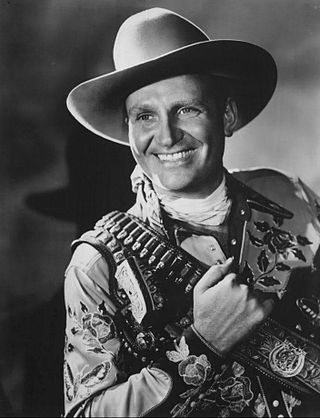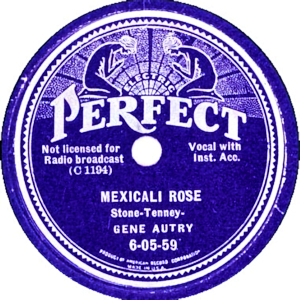
Orvon Grover "Gene" Autry, nicknamed the Singing Cowboy, was an American actor, musician, singer, composer, rodeo performer, and baseball team owner, who largely gained fame by singing in a crooning style on radio, in films, and on television for more than three decades, beginning in the early 1930s. During that time, he personified the straight-shooting hero — honest, brave, and true.

American Record Corporation (ARC), also referred to as American Record Company, American Recording Corporation, or ARC Records, was an American record company in operation from 1929 to 1938, and again from 1978 to 1982.
"How High the Moon" is a jazz standard with lyrics by Nancy Hamilton and music by Morgan Lewis. It was first featured in the 1940 Broadway revue Two for the Show, where it was sung by Alfred Drake and Frances Comstock. In Two for the Show, this was a rare serious moment in an otherwise humorous revue.
"Wheel of Fortune" is a popular song written by Bennie Benjamin and George David Weiss and published in 1951. It is best remembered in the 1952 hit version by Kay Starr.
"Again" is a popular song with music by Lionel Newman and words by Dorcas Cochran. It first appeared in the film Road House (1948), sung by Ida Lupino. An instrumental rendition was used in the movie Pickup on South Street (1953). By 1949, versions by Vic Damone, Doris Day, Tommy Dorsey, Gordon Jenkins, Vera Lynn, Art Mooney, and Mel Tormé all made the Billboard charts.
"Love Me or Leave Me" is a popular song written in 1928 by Walter Donaldson with lyrics by Gus Kahn. The song was introduced in the Broadway musical comedy Whoopee!, which opened in December 1928. Ruth Etting's performance of the song was so popular that she was also given the song to sing in the play Simple Simon, which opened in February 1930.
This is a list of notable events in country music that took place in 1948.
This is a list of notable events in country music that took place in the year 1945.

"The Nearness of You" is a popular song written in 1937 by Hoagy Carmichael (1899-1981), with lyrics by Ned Washington (1901-1976). Intended for an unproduced Paramount Pictures film titled Romance In The Rough, the studio's publishing division Famous Music reregistered and published the song three years later in 1940. It was first recorded by Chick Bullock (1898-1981) and his Orchestra on Vocalion. Despite numerous accounts to the contrary, the song was never scheduled for and does not appear in the production of the 1938 Paramount film Romance in the Dark.
This is a list of notable events in country music that took place in the year 1938.
This is a list of notable events in country music that took place in the year 1937.
This is a list of notable events in country music that took place in the year 1936.
This is a list of notable events in country music that took place in the year 1935.
This is a list of notable events in country music that took place in the year 1934.

"Mexicali Rose" is a popular song composed by bandleader and pianist Jack Breckenridge Tenney in the early 1920s, when he and his seven piece orchestra played the hotels and clubs of the Calexico and Mexicali border. The song became a hit in the mid-1930s, thanks to Gene Autry and Bing Crosby, around the same time that Tenney became a lawyer and was elected to the California State Assembly. Tenney was later appointed to head of the California Senate Factfinding Subcommittee on Un-American Activities.

"I'm Always Chasing Rainbows" is a popular Vaudeville song. The music is credited to Harry Carroll, but the melody is adapted from Fantaisie-Impromptu by Frédéric Chopin. The lyrics were written by Joseph McCarthy, and the song was published in 1917. It was introduced in the Broadway show Oh, Look! which opened in March 1918. The song was sung in the show by the Dolly Sisters. Judy Garland sang it in the 1941 film Ziegfeld Girl. It was subsequently sung by Jack Oakie in the 1944 film The Merry Monahans and was again featured in the 1945 film The Dolly Sisters (1945), where it was sung by John Payne. It was also included for part of the run of the 1973 revival of Irene. Additionally, the pre-chorus would not have been included until later covers in the 1940s, where the song would gain its iconic libretti.
Starting as the B-side of Gene Autry's "Mexicali Rose", penned by Autry, 'You're the Only Star in My Blue Heaven' was also popular in Hillbilly jukeboxes and radios in the mid-late 1930s. After the Columbia Broadcasting System, Inc. (CBS) purchased ARC and Gene's contract in December 1938., 'Star' was re-recorded on April 13, 1939 at Columbia's new Hollywood studio, located at KNX Radio, Sunset and Gower. The younger version is over 20 seconds shorter.

"I've Got the Key to the Kingdom" is a gospel blues song recorded in 1929 by Washington Phillips.
Oh Baby is a 1923 song by Walter Donaldson with lyrics by Buddy DeSylva. On December 21, 1923 it was recorded by Frank Crummit, vocal and ukulele, accompanied by Phil Ohman on piano, in New York, for the Victor label. That same December it was recorded by Billy Jones for the Banner label. Again for the Banner label it was recorded by the Lucky Strike Dance Orchestra in February 1924. It was recorded by the Wolverine Orchestra on May 6, 1924 in Richmond, Indiana for the Gennett Label. The Wolverine Orchestra was made up of Bix Beiderbecke on cornet, pianist Dick Voynow, trombonist Al Gandee, tenor saxophonist George Johnson, clarinetist Jimmy Hartwell, banjoist Bob Gillette, tuba player Min Leibrook, and drummer Vic Moore. Three days later, again in the Gennett studio, it was recorded by Bailey's Lucky Seven. It was recorded by Nathan Glantz and His Orchestra in March 1924 for the Emerson label.
"Big Boy" Teddy Edwards was an American blues musician, from the United States, who recorded 23 songs from 1930 to 1936. Edwards was active in the Chicago area of the United States. There is very little biographical information published on Edwards' life.






